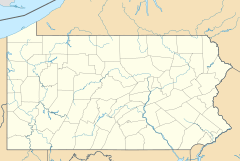Scab Hill, Pennsylvania facts for kids
Quick facts for kids
Scab Hill
|
|
|---|---|
| Country | United States |
| State | Pennsylvania |
| County | Westmoreland |
| Elevation | 1,086 ft (331 m) |
| Time zone | UTC-5 (Eastern (EST)) |
| • Summer (DST) | UTC-4 (EDT) |
| GNIS feature ID | 1187054 |
Scab Hill is a small place in Pennsylvania, United States. It is not a big city or a town with its own mayor. Instead, it is known as an unincorporated community. This means it is part of a larger area, like a county. It does not have its own separate local government.
Scab Hill was once known as a coal town. This means that many people who lived there worked in the coal mines nearby. Coal mining was a very important job in this area for a long time. Scab Hill is located in Westmoreland County, Pennsylvania. It was also sometimes called Adams Hill.
Contents
What is an Unincorporated Community?
An unincorporated community is a group of homes or buildings. It is not officially organized as a city or town. These communities are usually governed by the larger county they are in. This means the county provides services like roads and police.
How are They Different from Cities?
Cities and towns have their own local governments. They have elected officials like a mayor and a city council. These officials make local laws and manage services. Unincorporated communities do not have these separate governments. They rely on the county for most public services.
Life in a Coal Town
Scab Hill was a coal town. This means its history is closely tied to coal mining. Many people moved to these towns to work in the mines. Coal was a very important fuel source. It powered factories and heated homes.
Why Were Coal Towns Important?
Coal towns like Scab Hill played a big role in history. They helped provide the energy needed for industries to grow. Life in these towns often centered around the mines. The mines provided jobs for many families.
What Happened to Coal Towns?
Over time, the need for coal changed. Many mines closed down. This led to changes in coal towns. Some towns became smaller. Others found new ways to support themselves. The history of these towns shows how important mining once was.



